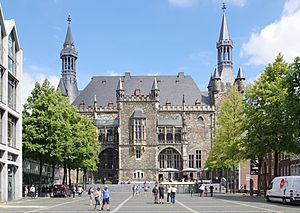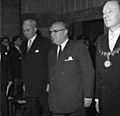Charlemagne Prize facts for kids
Quick facts for kids Charlemagne Prize |
|
|---|---|
 |
|
| Presented by | Society for the Conferring of the International Charlemagne Prize of Aachen |
| Location | Aachen, Germany |
| First awarded | 1 May 1950 |
| Currently held by | Ursula von der Leyen |

The Charlemagne Prize is a famous award given to people who have done important work to bring the countries of Europe closer together. This is often called European unification. The prize has been given out every year since 1950 by the German city of Aachen.
The award is named after Charlemagne, a powerful emperor who ruled a large part of Western Europe a long time ago. He is seen as one of the first leaders to unite the region. The prize is usually given to the winner on Ascension Day in a special ceremony at the Aachen Town Hall.
There is also a special version of the prize for young people called the European Charlemagne Youth Prize. It was started in 2008 by the Charlemagne Prize organizers and the European Parliament. It celebrates young people who are helping with European integration.
Contents
Why Was the Prize Created?

After the difficult times of World War II, many people wanted to make sure that European countries would work together peacefully. On December 19, 1949, a man named Kurt Pfeiffer suggested creating a prize. He wanted to honor people who helped with "Western European understanding and work for the community."
The city of Aachen was chosen to host the prize because it was once the center of Charlemagne's empire. The prize givers see Charlemagne as the "Founder of Western Culture."
The first person to win the Charlemagne Prize was Richard von Coudenhove-Kalergi. He was the founder of a group that promoted the idea of a united Europe.
The prize is not just a "thank you" for past work. It is also meant to encourage people to keep working for a peaceful and united Europe in the future. Kurt Pfeiffer said the prize "reaches into the future" and is about creating a "voluntary union of the European peoples."
Who Has Won the Prize?
The list of winners includes many important leaders and thinkers who helped build the European Union. It shows the history of how Europe came together. Here are some of the famous people and groups who have received the award.
Early Leaders and "Founding Fathers"
- Richard von Coudenhove-Kalergi (1950): The very first winner, who had the idea for a "United States of Europe."
- Alcide de Gasperi (1952): An Italian prime minister who worked hard for cooperation between European countries.
- Jean Monnet (1953): A French leader often called a "founding father" of the European Union.
- Konrad Adenauer (1954): The first chancellor of West Germany, who helped rebuild his country and its relationship with its neighbors.
- Winston Churchill (1955): The British prime minister who led his country during World War II and later called for a united Europe.
- Robert Schuman (1958): A French leader whose ideas led to the creation of the first European community.
Modern Leaders and Peacemakers
- King Juan Carlos I (1982): The King of Spain was honored for helping his country become a democracy and join Europe.
- François Mitterrand and Helmut Kohl (1988): The leaders of France and Germany won the prize together for their work in strengthening the friendship between their two countries.
- Václav Havel (1991): A writer and president of Czechoslovakia who helped bring freedom and democracy to Eastern Europe.
- Tony Blair (1999): A British prime minister recognized for his work on the peace process in Northern Ireland.
- Bill Clinton (2000): The American president was awarded for helping to build democracy and peace in Europe after the Cold War.
- The Euro (2002): The prize was given to the new European currency itself, for its role in uniting the continent's economies.
- Pope John Paul II (2004): He received a special version of the prize for his work in promoting freedom and human rights.
- Angela Merkel (2008): The German chancellor was honored for her leadership in uniting the European Union.
- Martin Schulz (2015): As President of the European Parliament, he worked to make the EU more democratic.
- Pope Francis (2016): He was recognized for spreading a message of peace, understanding, and mercy in Europe.
- Emmanuel Macron (2018): The French president was awarded for his vision of a stronger, more united Europe.
- Sviatlana Tsikhanouskaya, Maria Kalesnikava, Veronika Tsepkalo (2022): Three women from Belarus were honored for their brave fight for democracy and human rights in their country.
- Volodymyr Zelenskyy and the Ukrainian people (2023): The Ukrainian president and his people received the prize for their courageous defense of freedom and European values.
Images for kids
-
After the 2015 prize was awarded to Martin Schulz (center), many European leaders gathered on stage in Aachen.
-
Paul-Henri Spaak at the award ceremony in 1957.
-
Bill Clinton (left), who won in 2000, with other winners King Juan Carlos I of Spain, Václav Havel, and Simone Veil.
-
Angela Merkel wearing the prize medal in 2008.
See also
 In Spanish: Premio Carlomagno para niños
In Spanish: Premio Carlomagno para niños
- European Charlemagne Youth Prize
 | Valerie Thomas |
 | Frederick McKinley Jones |
 | George Edward Alcorn Jr. |
 | Thomas Mensah |





